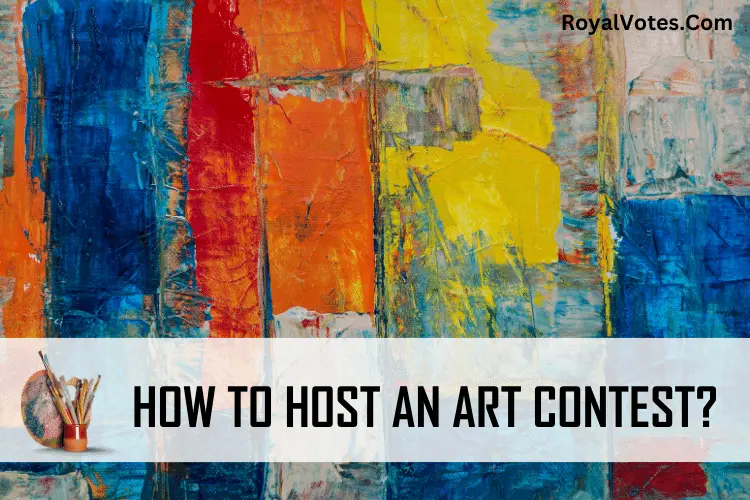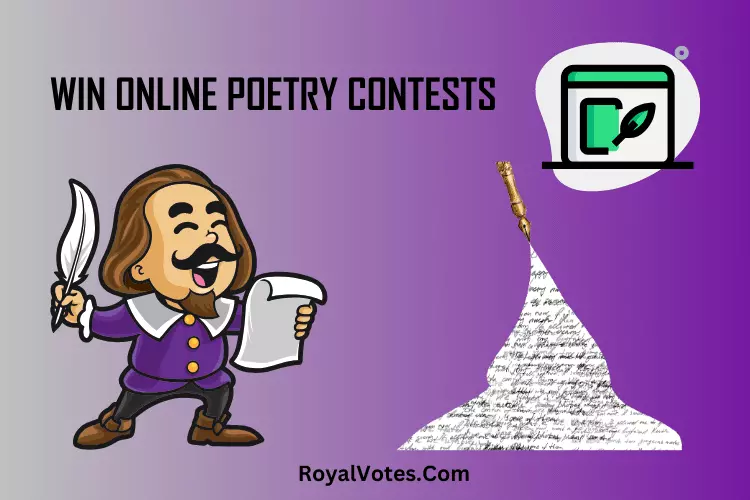Want to run an art contest in your community but don’t know how to get started? Read my blog on how to host an art contest on any platform, online or offline.
But first, let me tell you why you should host an art contest and its benefits.
Table of Contents

Why Host an Art Contest?
Well, there are plenty of reasons to host an art contest. Below are a few of them.
Encourages Artistic Expression
Art contests provide a platform for artists to express their creativity and originality. For instance, a community-themed art contest can encourage participants to showcase their unique interpretations of community life, fostering a sense of belonging and mutual respect.
Stimulates Healthy Competition
Healthy competition is a great motivator. A city-wide mural contest, for example, can inspire artists to push their creative boundaries and strive for excellence, improving their skills in the process.
Enhances Community Engagement
Hosting an art contest can significantly enhance community engagement. A local art contest displaying the winning artwork in a public park can foster a sense of pride and ownership among community members.
Provides Recognition to Artists
Art contests give artists the recognition they deserve for their talent and hard work. An online art contest with a global reach can expose artists to a larger audience, enhancing their visibility and opening up opportunities for networking and collaboration.
Promotes Art Appreciation
Art contests can cultivate a deeper appreciation for art within the community. In a school-based art contest, for example, students learn to appreciate the aesthetic value of art and understand the effort and passion involved in creating it.
How to Host An Art Contest: Both Online & Offline
Now that you know the benefits of hosting an art contest, let’s dive into the steps involved in organizing one.
How to Host an Online Art Contest?
If you want to host an art contest online, here are the steps you need to follow:
Step 1: Define the Contest Theme
The first step in hosting an online art contest is to define the theme. This will give a clear focus for the participants and make the contest more interesting. The theme could be topical, seasonal, or related to a cause you want to raise awareness about. Ensure the theme is clear and understandable to all potential participants.
Read also: Drawing contest ideas
Step 2: Set the Rules and Criteria
Next, establish the contest rules and judging criteria. Rules may include deadlines, art mediums allowed, the number of entries per participant, and copyright considerations. The judging criteria should be based on the theme and include factors like creativity, originality, and adherence to the theme.
Step 3: Choose the Judges
Choosing the right judges is crucial for the success of your art contest. Judges could be professional artists, art teachers, or other qualified individuals. Ensure your judges are impartial and have a good understanding of your contest’s theme and criteria.
Step 4: Create a Submission Platform
In an online art contest, you’ll need a platform for artists to submit their work. This could be a dedicated page on your website, a social media page, or a contest platform. Make sure the submission process is easy and user-friendly.
Step 5: Promote the Contest
Promote your contest widely through social media, email newsletters, local news outlets, and other promotion channels. The more people know about your contest, the more entries you’ll likely receive.
Step 6: Judging and Announcing Winner(s)
Once the submission deadline has passed, it’s time for the judges to review the entries and select the Winner (s) based on the pre-set criteria. Announce the winner(s) through your chosen platform and recognize all participants’ efforts.
Step 7: Give the Prize to the Winner (s)
The final step is to award the prize to the Winner (s). The prize could be a cash reward, a gift card, or any other creative and relevant item. You may also provide the Winner (s) something to display, such as a certificate or trophy. Share the winning artwork on your platform and recognize the winning artist’s talent.
How to Host an Offline Art Contest?
Hosting an offline art contest involves steps similar to hosting an online one. However, there are a few additional factors to consider:
Step 1: Choose the Venue
When hosting an offline art contest, you must choose a suitable venue for displaying the artwork and holding the award ceremony. This could be a public space like a park or community centre or a private space like an art gallery or school auditorium.
Step 2: Advertise Locally
Promote your offline art contest through flyers, posters, and local media outlets. Targeting the right audience and generating interest in your community is important. You may also promote your contest online to reach a wider audience.
Step 3: Set Up a Registration Process
In an offline art contest, participants must fill out registration forms and submit artwork. This will help you keep track of the participants and their contact information.
Step 4: Arrange for Judging and Award Ceremony
Like an online contest, judges need to be selected, and a judging process must be established. You’ll also need to plan for an award ceremony where the Winner (s) will be announced and recognized.
Read also: Ideas for design contest online
You may check out the below video on how to judge an artwork.
How to Promote Your Art Contest?
Online Promotion
Online promotion is a vital strategy in today’s digital era. Here are some effective ways to promote your art contest online:
- Social Media: Utilize platforms like Facebook, Instagram, Twitter, and LinkedIn to share information about your contest. Regularly posting updates, sneak peeks, and participant artwork can create excitement and increase engagement.
- Email Marketing: Send out newsletters or promotional emails to your existing network. Segment and personalize your email lists to make them more effective.
- Website and Blog: Use your website or blog to share detailed information about the contest. You can post updates, featured entries, or articles related to the contest to keep your audience engaged.
- Online Art Communities: Platforms like DeviantArt, Behance, and Dribble have large communities of artists who may be interested in your contest. Participating in these forums can spread the word about your contest.
- Paid Advertisements: Use paid advertisements on Google, Facebook, Instagram, or LinkedIn to reach a larger audience.
Offline Promotion
While the digital world offers extensive reach, offline promotion can be impactful, especially for local contests. Here’s how you can promote your art contest offline:
- Flyers and Posters: Distribute flyers and posters in strategic locations like art schools, libraries, community centres, cafes, and bookstores.
- Local Media: Contact local newspapers, magazines, radio stations, or TV channels. They might be interested in featuring your contest, especially if it benefits the local community.
- Networking Events: Attend local events, fairs, or meetups to invite artists and relevant communities to your contest personally.
- Art Schools and Universities: Collaborate with art schools and universities. They can help promote your contest to their students and faculty.
- Word of Mouth: Encourage friends, family, and colleagues to discuss the contest. Word of mouth is a powerful promotion tool, especially in tight-knit communities.
Read also: How to promote giveaway?
Best Price Ideas for Art Contest
You can’t leave out the prize when hosting an art contest. Here are some ideas for prizes that would be appealing to artists:
Cash Prize
An outright cash prize can be a strong incentive for artists. Not only does this reward them for their effort and skills, but it also provides financial support, which they can use to invest in their art supplies or other professional endeavours.
Art Supplies
Another good prize option is to offer art supplies. This could range from high-quality paints, brushes and canvases for traditional artists to graphic tablets and software subscriptions for digital artists. Art supplies can be costly; artists would highly appreciate such a prize.
Exhibition Opportunity
Providing the winning artist with an opportunity to exhibit their work can greatly boost their career. This could be at a local art gallery, community event, or online virtual exhibition. This exposure can help the artist gain recognition and build connections in the art world.
Artistic Training or Workshops
Offering the opportunity to attend art workshops or training can be a valuable prize. This could involve painting classes, digital art workshops, or seminars on selling and marketing art. Such a prize can help artists hone their skills and knowledge.
Art Books
Art books, whether collections of a famous artist’s work, instructional guides, or books on art theory, can serve as both inspiration and a learning resource. A carefully selected collection of art books can make a thoughtful and useful prize.
Commission Opportunities
Securing a commission can be a significant accomplishment for an artist. Therefore, arranging a commission opportunity can be an excellent prize. This could be a commission for a mural in the city, a portrait for a prominent individual, or an artwork for a local business.
Time to Host an Art Contest!
Hosting an art contest can be a fun and rewarding experience for the organizers and participants. By following the steps outlined above, you can ensure a successful and fair competition that promotes creativity and talent within your community.
Remember to keep promoting your contest even after it’s over; this will help build anticipation for future events.
FAQS on Hosting an Art Contest
What are the best online platforms to run art contests?
Some popular online platforms for hosting art contests are Submittable, OnlineJuriedShows.com, and ArtCall.org. These platforms offer submission management, customizable entry forms, and judging tools. Even you can host your contest on social media platforms as well.
How do you ensure impartiality in judging an art contest?
To ensure impartiality, it’s important to establish clear criteria for judging and have a diverse panel of judges with varying backgrounds and expertise. Having an independent moderator oversee the judging process can also be helpful.
Can I charge an entry fee for my art contest?
Yes, you may charge an entry fee for your art contest. But, it should be reasonable as it may discourage artists from participating. You can also offer discounts for early bird submissions or waive fees for certain groups, such as students.


